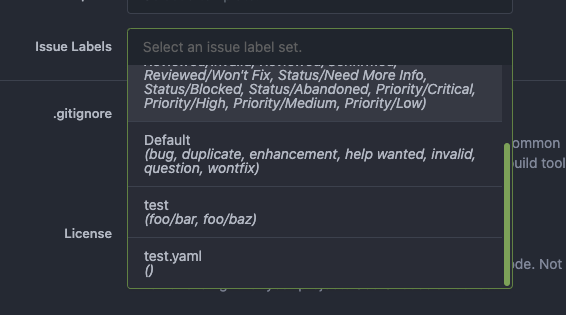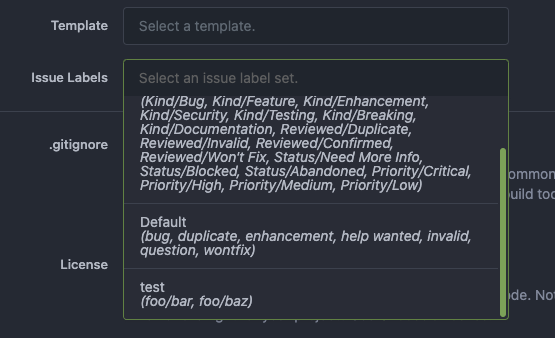mirror of
https://github.com/go-gitea/gitea.git
synced 2024-11-18 16:54:27 +01:00
Fix https://github.com/go-gitea/gitea/issues/23715 Other related PRs: * #23717 * #23716 * #23719 This PR is different from others, it tries to resolve the problem fundamentally (and brings more benefits) Although it looks like some more lines are added, actually many new lines are for tests. ---- Before, the code was just "guessing" the file type and try to parse them. <details>  </details> This PR: * Always remember the original option file names, and always use correct parser for them. * Another benefit is that we can sort the Label Templates now (before there was a map, its key order is undefined) 
119 lines
3.0 KiB
Go
119 lines
3.0 KiB
Go
// Copyright 2023 The Gitea Authors. All rights reserved.
|
|
// SPDX-License-Identifier: MIT
|
|
|
|
package label
|
|
|
|
import (
|
|
"errors"
|
|
"fmt"
|
|
"strings"
|
|
|
|
"code.gitea.io/gitea/modules/options"
|
|
|
|
"gopkg.in/yaml.v3"
|
|
)
|
|
|
|
type labelFile struct {
|
|
Labels []*Label `yaml:"labels"`
|
|
}
|
|
|
|
// ErrTemplateLoad represents a "ErrTemplateLoad" kind of error.
|
|
type ErrTemplateLoad struct {
|
|
TemplateFile string
|
|
OriginalError error
|
|
}
|
|
|
|
// IsErrTemplateLoad checks if an error is a ErrTemplateLoad.
|
|
func IsErrTemplateLoad(err error) bool {
|
|
_, ok := err.(ErrTemplateLoad)
|
|
return ok
|
|
}
|
|
|
|
func (err ErrTemplateLoad) Error() string {
|
|
return fmt.Sprintf("failed to load label template file %q: %v", err.TemplateFile, err.OriginalError)
|
|
}
|
|
|
|
// LoadTemplateFile loads the label template file by given file name, returns a slice of Label structs.
|
|
func LoadTemplateFile(fileName string) ([]*Label, error) {
|
|
data, err := options.Labels(fileName)
|
|
if err != nil {
|
|
return nil, ErrTemplateLoad{fileName, fmt.Errorf("LoadTemplateFile: %w", err)}
|
|
}
|
|
|
|
if strings.HasSuffix(fileName, ".yaml") || strings.HasSuffix(fileName, ".yml") {
|
|
return parseYamlFormat(fileName, data)
|
|
}
|
|
return parseLegacyFormat(fileName, data)
|
|
}
|
|
|
|
func parseYamlFormat(fileName string, data []byte) ([]*Label, error) {
|
|
lf := &labelFile{}
|
|
|
|
if err := yaml.Unmarshal(data, lf); err != nil {
|
|
return nil, err
|
|
}
|
|
|
|
// Validate label data and fix colors
|
|
for _, l := range lf.Labels {
|
|
l.Color = strings.TrimSpace(l.Color)
|
|
if len(l.Name) == 0 || len(l.Color) == 0 {
|
|
return nil, ErrTemplateLoad{fileName, errors.New("label name and color are required fields")}
|
|
}
|
|
color, err := NormalizeColor(l.Color)
|
|
if err != nil {
|
|
return nil, ErrTemplateLoad{fileName, fmt.Errorf("bad HTML color code '%s' in label: %s", l.Color, l.Name)}
|
|
}
|
|
l.Color = color
|
|
}
|
|
|
|
return lf.Labels, nil
|
|
}
|
|
|
|
func parseLegacyFormat(fileName string, data []byte) ([]*Label, error) {
|
|
lines := strings.Split(string(data), "\n")
|
|
list := make([]*Label, 0, len(lines))
|
|
for i := 0; i < len(lines); i++ {
|
|
line := strings.TrimSpace(lines[i])
|
|
if len(line) == 0 {
|
|
continue
|
|
}
|
|
|
|
parts, description, _ := strings.Cut(line, ";")
|
|
|
|
color, labelName, ok := strings.Cut(parts, " ")
|
|
if !ok {
|
|
return nil, ErrTemplateLoad{fileName, fmt.Errorf("line is malformed: %s", line)}
|
|
}
|
|
|
|
color, err := NormalizeColor(color)
|
|
if err != nil {
|
|
return nil, ErrTemplateLoad{fileName, fmt.Errorf("bad HTML color code '%s' in line: %s", color, line)}
|
|
}
|
|
|
|
list = append(list, &Label{
|
|
Name: strings.TrimSpace(labelName),
|
|
Color: color,
|
|
Description: strings.TrimSpace(description),
|
|
})
|
|
}
|
|
|
|
return list, nil
|
|
}
|
|
|
|
// LoadTemplateDescription loads the labels from a template file, returns a description string by joining each Label.Name with comma
|
|
func LoadTemplateDescription(fileName string) (string, error) {
|
|
var buf strings.Builder
|
|
list, err := LoadTemplateFile(fileName)
|
|
if err != nil {
|
|
return "", err
|
|
}
|
|
|
|
for i := 0; i < len(list); i++ {
|
|
if i > 0 {
|
|
buf.WriteString(", ")
|
|
}
|
|
buf.WriteString(list[i].Name)
|
|
}
|
|
return buf.String(), nil
|
|
}
|